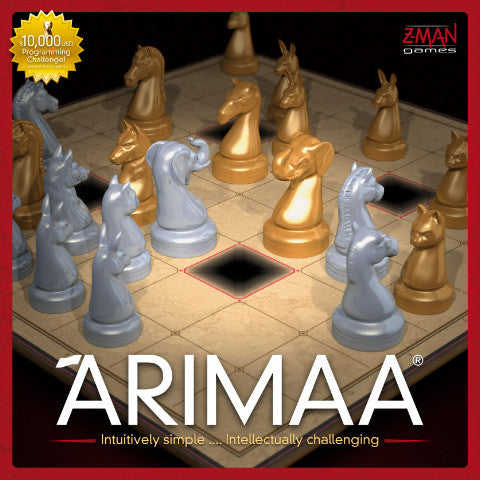Arimaa
Products title that includes 'PRE-ORDER' is subject to our Pre-order Policy
Couldn't load pickup availability
Delivery and Shipping
Delivery and Shipping
For more details, please refer to our Shipping and Order Information.
Pre-Order Policy
- Pre-order items are charged at the time the order is placed.
- Prices for pre-order items are subject to change based on final landed costs.
- If the final price is lower, the difference will be refunded to the customer in the form of store credit.
- If the final price is higher, customers will be given the option to either:
- Pay the difference, or
- Cancel the item for a full refund.
- Orders containing pre-order items will be placed on hold until all items in the order are available.
- Once all items have arrived and pricing remains unchanged, the order will be automatically shipped.
- Pre-orders are fulfilled on a first-come, first-served basis.
- If a pre-ordered item becomes unavailable (e.g., the publisher cancels the product), a full refund will be issued.
- Pre-orders may be cancelled and refunded by customers or the store.
- For transactions that are no longer eligible for direct refunds due to payment processor limitations, a store credit will be issued instead.
Description
Description
| Designer |
Aamir Syed Omar Syed |
| Publisher | Z-Man Games |
| Players | 2 |
| Playtime | 60 mins |
| Suggested Age | 8 and up |
Arimaa, pronounced "ah-REE-ma" is a modern strategy game that simulates a sport similar to Rugby or Football (American style) but without the ball. Instead of getting a ball to the end zone the team tries to help their smallest player reach the end zone. The other team is also trying to do the same thing at the same time. The first team to get their smallest player to the end zone wins the game. As the coach of the team you are the mastermind behind the teams strategy and must guide them to victory.
The game is played on a field divided into an 8x8 grid of 64 squares. The two teams have 16 players each; with one team being gold and the other silver. The players are assigned positions based on their size. Animal names are used for the positions. Each team has 1 elephant, 1 camel, 2 horses, 2 dogs, 2 cats and 8 rabbits; from largest to smallest in size. Any one of the eighth rabbit players needs to reach the end zone to win the game.
The game begins with an empty field. The gold team enters first and the players stand in any configuration on the first and second ranks. Only one player may stand in a square at a time. The silver team then enters the field and the players may stand in any configuration on the seventh and eighth ranks. The first and eighth ranks are the end zones.
The gold team moves first followed by silver. A move consists of 4 steps where each step is the movement of a player from the current square to an adjacent unoccupied square. In Arimaa adjacent always means orthogonally adjacent; so a player may step to an adjacent square by moving left, right, forward and backward. However the rabbit players cannot step backwards. The team can distribute the four steps any way it wants. All four steps can be taken by one player, or various different players can take one or more steps. A player taking more than one step may change directions after each step. The team does not need to use all 4 steps as long as at least one step is taken to change the state of the game.
Players can push or pull smaller players from the opposing team. They cannot push or pull opposing players that are larger or equal in size. A push or pull requires two steps and must be completed within the same turn. A larger player can push the smaller player to an adjacent unoccupied square and move into the vacated square. A larger player can pull by moving to an adjacent unoccupied square and dragging the smaller player into the vacated square. A player cannot do both a push and pull simultaneously.
Players that are adjacent to larger players from the opposing team are held frozen and cannot move. However if a teammate is adjacent to the frozen player, the player is no longer frozen and can move.
There are four muddy spots on the field called traps. They are located at c3, f3, c6 and f6. Players may stand or cross through the traps so long as a teammate is adjacent to the trap. A player that is on a trap and has no teammate adjacent for support will slip and fall into the the mud and has to sit out the rest of the game.
A team that has lost all the rabbit players loses the game (by elimination). A team that cannot make a move at all also loses the game (by immobilization):
History:
Arimaa was invented by Omar Syed, an Indian American computer engineer trained in artificial intelligence. Syed was inspired by Garry Kasparov's defeat at the hands of the chess computer Deep Blue to design a new game which could be played with a standard chess set, would be difficult for computers to play well, but would have rules simple enough for his then four-year-old son Aamir to understand. ("Arimaa" is "Aamir" spelled backwards plus an initial "a").
In 2002 Syed published the rules to Arimaa and announced a $10,000 prize, available annually until 2020, for the first computer program (running on standard, off-the-shelf hardware) able to defeat each of three top-ranked human players in a three-game series.

